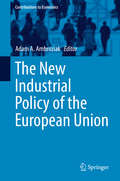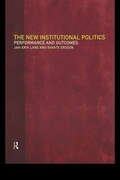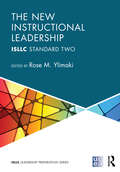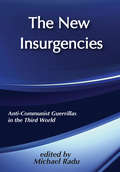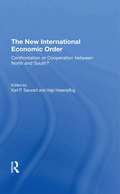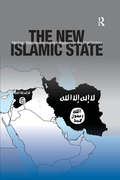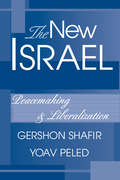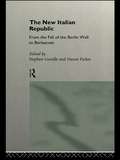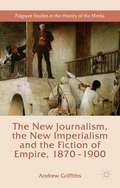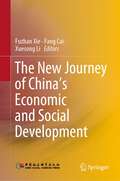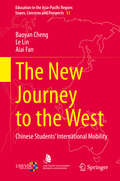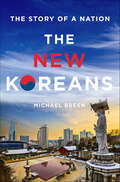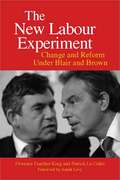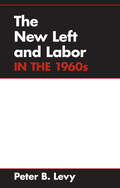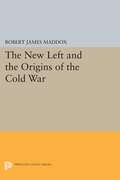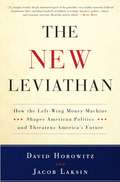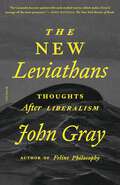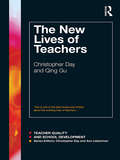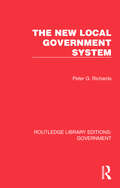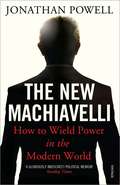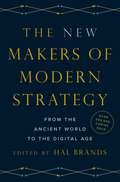- Table View
- List View
The New Industrial Policy of the European Union
by Adam A. AmbroziakThe main objective of this book has been to carry out research into the definition of industrial policy and its goals; to evaluate previously-introduced policies and instruments; and to identify the future challenges for and features of a modern EU industrial policy. A modern industrial policy is seen as a non-traditional policy towards the industrial sector, based not necessarily on only the elimination of market failures (within the sectoral and/or horizontal approaches), but rather on the expanding the scope of industrial economic activities within the framework of both the pre- and post-fabrication stages. The book targets three market segments: academics; policy and decision-makers at the EU, national and regional level, as well as business practitioners. It includes a wide-ranging analysis of different spheres of industrial policies conducted within the European Union, making it of interest to an international audience. Each chapter also offers detailed and valuable comments, as well as conclusions that can be generally applied, ensuring the book's universality. The book presents the results of a research project conducted in the Collegium of World Economy at the Warsaw School of Economics.
The New Institutional Politics: Outcomes and Consequences
by Jan-Erik Lane Svante ErssonThe New Institutional Politics is a comparative study of the impact of political institutions upon outcomes, and covers some of the major themes in the new institutionalism. It looks at how various democratic institutions like Konkordanzdemokratie or corporatism promote better outcomes than Westminster institutions. The evaluation of the performance of political institutions covers the executive, the legislature and the judicial system. The book also looks at economic outcomes such as affluence and GDP growth as well as social ones like income distribution and quality of life. It examines the problems of institutional effects in democracies and dictatorships and provides analysis of some of the major models in political science. This is an exploration of how political institutions matter for political, economic and social outcomes. It estimates their impact in relation to other major factors such as culture and social structure. It is written for political scientists and graduates studying comparative politics.
The New Instructional Leadership: ISLLC Standard Two (PSEL/NELP Leadership Preparation)
by Rose M. YlimakiCo-published with UCEA, this exciting new textbook is the first to tackle the ISLLC Standard 2—Instructional Leadership. In light of recent curriculum reforms, accountability policies, and changing demographics, today’s leaders must not only have expertise in culture building and supervision skills, but also in adult learning, cultural funds of knowledge, curriculum, and the role of politics. The New Instructional Leadership helps aspiring school leaders examine their beliefs and practices about instructional leadership in relation to ISLLC Standard 2 and provides the theory, learning experiences, and analytical tools for effective leadership in today’s world. Chapters cover issues of collaboration, curricular programming, motivation, supervision, accountability, capacity building, use of technology, monitoring, and evaluation. Special Features: Case Studies—encourage readers to reflect and actively engage with instructional leadership beliefs and practices. Fieldwork and Extended Reflections—a range of inquiry activities provide students with opportunities to consider problems of practice related to the standard. Strategies for Leaders—offers students practical and accessible ideas in order to transform their practice to address the complex challenges facing contemporary schools. Theoretically grounded and research-based, this unique volume will help aspiring and current leaders to understand instructional leadership and help them to sustain strong curricular and instructional programs in their increasingly diverse schools and communities.
The New Insurgencies: Anti-communist Guerrillas in the Third World
by Michael RaduThe appearance of ideologically motivated anti-communist insurgent groups in the Third World is an important new phenomenon that has received little serious attention. Analysis has focused on American attitudes, while the indigenous roots and motivations of such groups have remained largely unexplored. Michael Radu fills in the gap in The New Insurgencies, with case studies and contributions from Anthony Arnold, Paul Henze, Justus van de Kroef, and Jack Wheeler.As the authors show, more often than not, Third World anti-communist insurgencies express a general rejection of values and ideologies from outsiders. Many of these insurgencies reflect violent opposition to regimes installed by the Soviets during the 1970s, yet they only rarely articulate a struggle for liberal democracy. Nationalism, religion, or the preservation of traditional political and economic patterns are more often the true motivations. And while insurgents often apply military and occasionally political methods used by successful Marxist-Leninist insurgencies of this century, they tend to be rural based and close to the aspirations of the peasant masses rather than directed by the educated and urbanized elites.The New Insurgencies includes case studies of major anti-communist movements today, including those in Afghanistan, Cambodia, Ethiopia, Mozambique, Angola, and Nicaragua. It shows that in each, the role of local powers such as South Africa, Thailand, and Pakistan rather than direct U.S. support has been critical to the insurgents' effectiveness. In part this may be because the old bipartisan Washington consensus based on anti-communism has evaporated; and Radu explores why this has occurred.Regardless of Washington's support, the new insurgencies are likely to persist. Their impact on U.S., Soviet, and world policy will be profound. The New Insurgencies combines extensive use of firsthand data, including personal knowledge of some of the major personalities involved, with extensive bibliogra
The New International Economic Order: Confrontation Or Cooperation Between North And South?
by Karl P Sauvant Hajo HasenpflugIn the face of the continuing economic gap between the industrialized and the developing countries, the Third World began to demand a reorganization of the international economic system—its mechanisms, organizations, purposes—that would make the system responsive to the needs of all of its members. The United Nations’ Sixth Special Session in 1974
The New Islamic State: Ideology, Religion and Violent Extremism in the 21st Century
by Tom Lansford Jack CovarrubiasThe rise of the Islamic State has dramatically forced a recalculation of political order and security in the Persian Gulf and broader Greater Middle East by the United States and its allies and adversaries, including, most notably, Iran, Israel and Saudi Arabia. Since the Arab Spring of 2011, the Islamic State has altered the military balance in the Syrian intra-state conflict and captured significant territory in Iraq. Its military successes has attracted foreign fighters from more than 100 countries, drawn in some cases by a sophisticated recruitment strategy that effectively combines a jihadist message with a social media outreach program targeting vulnerable Muslim populations in the region and the West. The Islamic State has prompted renewed American and allied military intervention in Iraq and Syria, and complicated the US relationship with its Iranian adversaries. The New Islamic State examines the rise of the religious extremist organization from the ashes of al-Qaeda in Iraq to its current efforts in Syria and Iraq and is designed to provide a comprehensive overview of the Islamic State, its effects on the Persian Gulf and Greater Middle East, and the response of both regional and great powers. The book is suitable for academics, policymakers and the general public.
The New Islamic State: Ideology, Religion and Violent Extremism in the 21st Century
by Jack Covarrubias Tom LansfordThe rise of the Islamic State has dramatically forced a recalculation of political order and security in the Persian Gulf and broader Greater Middle East by the United States and its allies and adversaries, including, most notably, Iran, Israel and Saudi Arabia. Since the Arab Spring of 2011, the Islamic State has altered the military balance in the Syrian intra-state conflict and captured significant territory in Iraq. Its military successes has attracted foreign fighters from more than 100 countries, drawn in some cases by a sophisticated recruitment strategy that effectively combines a jihadist message with a social media outreach program targeting vulnerable Muslim populations in the region and the West. The Islamic State has prompted renewed American and allied military intervention in Iraq and Syria, and complicated the US relationship with its Iranian adversaries. The New Islamic State examines the rise of the religious extremist organization from the ashes of al-Qaeda in Iraq to its current efforts in Syria and Iraq and is designed to provide a comprehensive overview of the Islamic State, its effects on the Persian Gulf and Greater Middle East, and the response of both regional and great powers. The book is suitable for academics, policymakers and the general public.
The New Israel: Peacemaking And Liberalization
by Gershon ShafirThe New Israel: Peacemaking and Liberalization argues that the ongoing Israeli-Palestinian peace process will be expedited by increased economic liberalization. Israel has undergone dramatic economic change in the 1990s, shifting from a strongly protectionist, state-centered economy to a more international, neoliberal one. The book maintains that these fundamental changes have in turn transformed Israeli society as a whole, resulting in a significant moderation of attitudes toward the Palestinian people and Palestinian nationalism. The New Israel contains contributions from both established Israeli sociologists and promising young scholars. The New Israel: Peacemaking and Liberalization is an insightful commentary on one of the most crucial international issues of our time.
The New Italian Republic: From the Fall of the Berlin Wall to Berlusconi
by Stephen Gundle Simon ParkerFirst published in 2004. Routledge is an imprint of Taylor & Francis, an informa company.
The New Journalism, the New Imperialism and the Fiction of Empire, 1870-1900 (Palgrave Studies in the History of the Media)
by Andrew GriffithsAggressive policy, enthusiastic news coverage and sensational novelistic style combined to create a distinctive image of Britain's Empire in late-Victorian print media. The New Journalism, the New Imperialism and the Fiction of Empire, 1870-1900 traces this phenomenon through the work of editors, special correspondents and authors.
The New Journey of China’s Economic and Social Development
by Fang Cai Xuesong Li Fuzhan XieThis book aims at China's economic and social development, which has embarked on a new journey. It collects more than 20 major research achievements of researchers in relevant fields of the Chinese Academy of Social Sciences. These topics cover rural revitalization and anti-poverty, industrialization and manufacturing transformation, service industry upgrading, fiscal and taxation system and fiscal sustainability, major financial reform, industry and competition policy, ownership structure, new pattern of opening up, digital economy, innovation driven, financial stability, macro-control, new urbanization, regional development, ecological environment, aging population, labor market, income distribution, social governance, people's livelihood, social security, the rule of law, cultural power, and other major issues. This book helps people from all walks of life better understand and grasp the new trends, opportunities, and challenges of China's economic and social development in the future and provides useful reference for thinking about China's medium and long-term development strategy and development path.
The New Journey to the West: Chinese Students’ International Mobility (Education in the Asia-Pacific Region: Issues, Concerns and Prospects #53)
by Baoyan Cheng Le Lin Aiai FanThis book provides a comprehensive assessment of the cross-border mobility of Chinese students and addresses the questions of who in China chooses to study overseas, why they want to do so, and what the impacts of this mobility are on China’s social stratification. In addition, it explores the challenges that these students face in terms of adaptation and identity formation once they have arrived in the destination country. Adopting a push-and-pull framework to analyze the data, it offers a unique and insightful resource.
The New Koreans: The Story of a Nation
by Michael BreenJust a few decades ago, the South Koreans were an impoverished, agricultural people. In one generation they moved from the fields to Silicon Valley. They accomplished this through three totally unexpected miracles: economic development, democratization, and the arrival of their culture to global attention.Who are the Koreans? What are they like? The New Koreans examines how they have been perceived by outsiders, the features that color their “national character,” and how their emergence from backwardness, poverty, and brutality happened. It also looks at why they remain unhappy—with the lowest birth rates and highest suicide rates in the developed world. In The New Koreans, Michael Breen provides compelling insight into the history and character of this fascinating nation of South Korea, and casts an eye to future developments, as well as across the DMZ into North Korea.
The New Labour Experiment: Change and Reform Under Blair and Brown
by Florence Faucher-King Patrick Le Galès Gregory ElliottThe authors (both of the Centre d'Etudes Européennes, Sciences Po, France) conduct an assessment of the policies of New Labour under Tony Blair and Gordon Brown and their impact on British policy and government-society relations from 1997 to 2009. They find that New Labour has helped transform Britain into a "market society" while undermining collective democratic purpose. They also argue that ideas of equality have been subordinated to ideas of opportunity. The New Labour society, then, "is a meritorcratic society, geared towards the needs and the priorities of the middle class, but also an inclusive society in which the issue of social justice is bound up with individual effort and brownie points thanks to an ability to make the "right" choices. " Annotation ©2010 Book News, Inc. , Portland, OR (booknews. com)
The New Left and Labor in 1960s (Working Class in American History)
by Peter B. LevyIt is a powerful story: the relationship between the 1960s New Left and organized labor was summed up by hardhats confronting students and others over US involvement in Vietnam. But the real story goes beyond the "Love It or Leave It" signs and melees involving blue-collar types attacking protesters. Peter B. Levy challenges these images by exploring the complex relationship between the two groups. Early in the 1960s, the New Left and labor had cooperated to fight for civil rights and anti-poverty programs. But diverging opinions on the Vietnam War created a schism that divided these one-time allies. Levy shows how the war, combined with the emergence of the black power movement and the blossoming of the counterculture, drove a permanent wedge between the two sides and produced the polarization that remains to this day.
The New Left and the Origins of the Cold War
by Robert Maddox<p>As more and more people are questioning the assumptions of present U.S. foreign policy they are reexamining the roots of these policies in the diplomacy of the Cold War. This scrutiny has made the origins of the Cold War the most controversial issue in American diplomatic history. Now a complete new dimension has been added to the debate by the charges leveled by Robert James Maddox in The New Left and the Origins of the Cold War. <p>How did the Cold War begin? Who or what was responsible? Could it have been avoided? Was it a temporary condition created by a combination of individual personalities and historical factors, or did it represent the clash of fundamentally irreconcilable political systems? The orthodox explanation of the Cold War is that it was "the brave and essential response of free men to Communist aggression." A number of scholars more or less identified with the New Left have challenged the conventional explanation by asserting that the U.S. bears the major responsibility for its onset. One group of revisionists sees this as the result of a failure of statesmanship on the part of Truman and the advisors around him, the other that the Cold War was the inevitable result of the American system as it developed over the years. <p>Their conclusions have often been challenged in matters of interpretation. Robert Maddox, however, believes that an examination of the manner in which new interpretations are reached should precede dialogues over the ideas themselves. Consequently he has examined seven of the most prominent New Left works: The Tragedy of American Diplomacy by William Appleman Williams; The Cold War and Its Origins by D. F. Fleming; Atomic Diplomacy by Gar Alperovitz; The Free World Colossus by David Horowitz; The Politics of War by Gabriel Kolko; Yalta by Diane Shaver Clemens; and Architects of Illusion by Lloyd C. Gardner. After detailed comparisons of the evidence they present with the sources from which it was taken, he concludes that these books are based on pervasive misuse of the source materials and fail to measure up to the most elementary standards of good scholarship.</p>
The New Legal Realism, Volume II: Studying Law Globally
by Sally Engle Merry Heinz KlugThis is the second of two volumes announcing the emergence of the new legal realism. At a time when the legal academy is turning to social science for new approaches, these volumes chart a new course for interdisciplinary research by synthesizing law on the ground, empirical research, and theory. Volume 2 explores the integration of global perspectives and information into our understanding of law. Increasingly, local experiences of law are informed by broader interactions of national, international, and global law. Lawyers, judges, and other legal actors often have to respond to these broader contexts, while those pursuing justice in various global contexts must wrestle with the specific problems of translation that emerge when different concepts of law and local circumstances interact. Using empirical research, the authors in this path-breaking volume shed light on current developments in law at a global level. Demonstrates the importance of interdisciplinary translation between law and social sciences Introduces readers to the scholarship of today's leading new legal realists. Shows how new legal realism can provide a broader lens than the empirical legal studies movement.
The New Leviathan
by Roger KimballThe ideas and policies that are percolating down from 1600 Pennsylvania Avenue and Capitol Hill-increased government intervention, calls to "spread the wealth around," onerous regulations, and bailouts for all-are not new. We've been down this road before. We know where it leads. It is that forlorn byway that Friedrich von Hayek called the Road to Serfdom.The good news is we don't have to go down that road again. Resurrecting 18th-century style pamphleteering, Encounter Broadsides provide the intellectual ammunition for the battle over America's future. From the folly of Obamacare, to the politicization of the Justice Department, or disastrous efforts to nationalize our education system, each Encounter Broadside assaults a new tentacle of the rising statism. Now, for the first time, The New Leviathan collects these salvos in one essential handbook. The New Leviathan is edited by Roger Kimball with contributions from John R. Bolton, Daniel DiSalvo, Richard A. Epstein, Peter Ferrara, John Fund, Victor Davis Hanson, Andrew C. McCarthy, Betsy McCaughey, Stephen Moore, Michael B. Mukasey, Glenn Harlan Reynolds, Rich Trzupek, and Kevin D. Williamson. Together, they make the definitive case for liberty and democratic capitalism at a time when they are under siege from the resurgence of collectivist sentiment.
The New Leviathan: How the Left-Wing Money-Machine Shapes American Politics and Threatens America's Future
by David Horowitz Jacob LaksinAt a time when the national political debate is about inequality and fairness, bestselling author David Horowitz and coauthor Jacob Laksin have written an unsettling book about the distribution of power in America. Thoroughly researched and amply documented, The New Leviathan overturns the conventional wisdom about which end of the political spectrum represents the rich and powerful, and which represents the people. The Democratic Party presents itself to the electorate as the party of working families and the poor. In the 2000 election campaign, Democrat Al Gore ran on the slogan "The People vs. the Powerful," while President Obama describes himself as a "grassroots organizer" and a spokesman for "fairness" and "progressive change." Such is the world of political myth. In reality, the Democrats and the Obama progressives represent the richest and most powerful political machine in American history. Backed by a near trillion-dollar treasury in America's oldest and largest tax-exempt foundations, progressives outspend conservatives by a factor of seven to one. In The New Leviathan, David Horowitz and Jacob Laksin examine this growing financial power of left-wing organizations and politicians. They show how left-wing foundations underwrote the political career of Barack Obama and how massive funding advantages for progressive proposals have disenfranchised American voters and shifted the national policy debate dramatically to the left. The New Leviathan draws connections between the Obama administration and progressive organizations from labor unions to media outlets to nonprofits to political groups, and shows how on key policy fronts--national security, immigration, citizenship, environment, and health care--the sheer force of left-wing financial resources has reconfigured the nation's political agenda.
The New Leviathans: Thoughts After Liberalism
by John GrayA bold, provocative reckoning with our current political delusions and dysfunctions.Ever since its publication in 1651, Thomas Hobbes’s Leviathan has unsettled and challenged how we understand the world. Condemned and vilified by each new generation, his cold political vision continues to see through any number of human political and ethical vanities.In his wonderfully stimulating book The New Leviathans, John Gray allows us to understand the world of the 2020s with all its contradictions, moral horrors, and disappointments. The collapse of the USSR ushered in an era of near apoplectic triumphalism in the West: a genuine belief that a rational, liberal, well-managed future now awaited humankind and that tyranny, nationalism, and unreason lay in the past. Since then, so many terrible events have occurred and so many poisonous ideas have flourished, and yet our liberal certainties treat them as aberrations that will somehow dissolve. Hobbes would not be so confident.Filled with fascinating and challenging observations, The New Leviathans is a powerful meditation on historical and current folly. As a species we always seem to be struggling to face the reality of base and delusive human instincts. Might a more self-aware, realistic, and disabused ethics help us?
The New Lives of Teachers (Teacher Quality and School Development)
by Christopher Day Qing GuThe New Lives of Teachers examines the varied, often demanding commitments on teachers’ lives today as they attempt to pursue careers in primary and secondary education. Building upon Huberman’s classic study, it probes not only teachers’ everyday lives, but also the ways in which they negotiate the pitfalls of professional development and the different life and work ‘scenarios’ that challenge their sense of identity, well-being and effectiveness. The authors provide a new evidence-based framework to investigate and understand teachers’ lives. Using a range of contemporary examples of teaching, they demonstrate that it is the relative success with which teachers manage various personal, work and external policy challenges that is a key factor in the satisfaction, commitment, well-being and effectiveness of teachers in different contexts and at different times in their work and lives. The positive and negative influences upon career and professional development and the influences of school leadership, culture, colleagues and conditions are also shown to be profound and relate directly to teacher retention and the work-life balance agenda. The implications of these insights for teaching quality and teacher retention are discussed. This book will be of special interest to teachers, teachers’ associations, policy makers, school leaders, and teacher educators, and should also be of interest to students on postgraduate courses.
The New Local Government System (Routledge Library Editions: Government)
by Peter G. RichardsOriginally published in 1956, this book outlines the history of delegation in local government since the establishment of county councils in 1888. It describes the use made of delegation over a wide range of council services. The technique of delegation has become more important in recent years and represents the compromise of the competing claims of county and district councils to control local government. This book is an important contribution both to the detailed study of local administration and to the debate on the future pattern of local government.
The New Machiavelli: How to Wield Power in the Modern World
by Jonathan PowellIllustrating each of Machiavelli's maxims with a description of events that occurred during Tony Blair's time as prime minister, Blair's former close adviser gives a devastating, frank, and insightful analysis of how power is wielded in the modern world In a 21st-century reworking of Niccolò Machiavelli's influential masterpiece, Jonathan Powell argues that the Italian philosopher is misunderstood, and explains how the lessons derived from his experience as an official in 15th-century Florence can still apply today. Drawing on his own unpublished diaries during his time as Blair's chief of staff, Powell gives a frank account of the intimate details of the internal political struggles, including the failure to join the Euro or hold a referendum on the European constitution; the wars in Iraq, Afghanistan, and Kosovo; the peace negotiations in Northern Ireland; and the relations with Clinton, Bush, and Chirac. Short, stark, and clear -- much like The Prince -- this gripping account of life inside "the bunker" of Number 10 draws lessons from those experiences, not just for political leaders but for anyone who has access to the levers of power.
The New Machiavelli: How to Wield Power in the Modern World
by Jonathan PowellThe New Machiavelli is a gripping account of life inside 'the bunker' of Number 10. In his twenty-first century reworking of Niccolo Machiavelli's influential masterpiece, The Prince, Jonathan Powell - Tony Blair's Chief of Staff from 1994 - 2007 - recounts the inside story of that period, drawing on his own unpublished diaries. Taking the lessons of Machiavelli derived from his experience as an official in fifteenth-century Florence, Powell shows how these lessons can still apply today. Illustrating each of Machiavelli's maxims with a description of events that occurred during Tony Blair's time as Prime Minister, The New Machiavelli is designed to be The Prince for modern times.
The New Makers of Modern Strategy: From the Ancient World to the Digital Age
by Williamson Murray John Lewis Gaddis Robert Kagan Walter Russell Mead Hew Strachan Brendan Simms Daniel Marston Seth G. Jones James Lacey Carter Malkasian Mark Moyar Lawrence Freedman Wayne Wei-siang Hsieh Thomas G. Mahnken Eric Helleiner Jonathan Kirshner Ahmed S. Hashim Toshi Yoshihara John H. Maurer Michael V. Leggiere Matthew Kroenig Joshua Rovner Thomas Rid Guy Laron Sergey Radchenko Kori Schake Priya Satia Michael Cotey Morgan Margaret MacMillan Charles Edel Dmitry Adamsky John Bew Francis Gavin Sue Mi Terry Jason K. Stearns Eric Edelman Antulio Echevarria II Iskander Rehman Matt J. Schumann Sarah C. Paine Tami Biddle Tanvi Madan Christopher J. Griffin Elizabeth Economy Andrew EhrhardtThe essential resource on military and political strategy and the making of the modern worldThe New Makers of Modern Strategy is the next generation of the definitive work on strategy and the key figures who have shaped the theory and practice of war and statecraft throughout the centuries. Featuring entirely new entries by a who’s who of world-class scholars, this new edition provides global, comparative perspectives on strategic thought from antiquity to today, surveying both classical and current themes of strategy while devoting greater attention to the Cold War and post-9/11 eras. The contributors evaluate the timeless requirements of effective strategy while tracing the revolutionary changes that challenge the makers of strategy in the contemporary world. Amid intensifying global disorder, the study of strategy and its history has never been more relevant. The New Makers of Modern Strategy draws vital lessons from history’s most influential strategists, from Thucydides and Sun Zi to Clausewitz, Napoleon, Churchill, Mao, Ben-Gurion, Andrew Marshall, Xi Jinping, and Qassem Soleimani.With contributions by Dmitry Adamsky, John Bew, Tami Davis Biddle, Hal Brands, Antulio J. Echevarria II, Elizabeth Economy, Charles Edel, Eric S. Edelman, Andrew Ehrhardt, Lawrence Freedman, John Lewis Gaddis, Francis J. Gavin, Christopher J. Griffin, Ahmed S. Hashim, Eric Helleiner, Wayne Wei-siang Hsieh, Seth G. Jones, Robert Kagan, Jonathan Kirshner, Matthew Kroenig, James Lacey, Guy Laron, Michael V. Leggiere, Margaret MacMillan, Tanvi Madan, Thomas G. Mahnken, Carter Malkasian, Daniel Marston, John H. Maurer, Walter Russell Mead, Michael Cotey Morgan, Mark Moyar, Williamson Murray, S.C.M. Paine, Sergey Radchenko, Iskander Rehman, Thomas Rid, Joshua Rovner, Priya Satia, Kori Schake, Matt J. Schumann, Brendan Simms, Jason K. Stearns, Hew Strachan, Sue Mi Terry, and Toshi Yoshihara.
